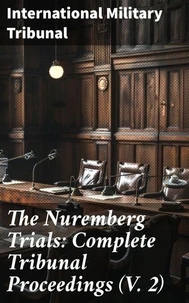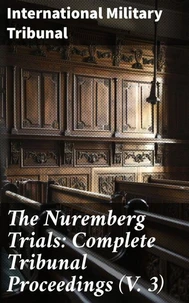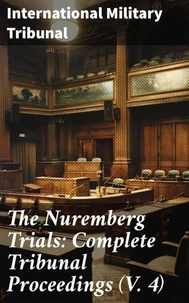The Nuremberg Trials (Vol.4)
Par :Formats :
Disponible dans votre compte client Decitre ou Furet du Nord dès validation de votre commande. Le format ePub est :
- Compatible avec une lecture sur My Vivlio (smartphone, tablette, ordinateur)
- Compatible avec une lecture sur liseuses Vivlio
- Pour les liseuses autres que Vivlio, vous devez utiliser le logiciel Adobe Digital Edition. Non compatible avec la lecture sur les liseuses Kindle, Remarkable et Sony
 , qui est-ce ?
, qui est-ce ?Notre partenaire de plateforme de lecture numérique où vous retrouverez l'ensemble de vos ebooks gratuitement
Pour en savoir plus sur nos ebooks, consultez notre aide en ligne ici
- Nombre de pages528
- FormatePub
- ISBN406-4-06-638099-1
- EAN4064066380991
- Date de parution07/05/2021
- Protection num.Digital Watermarking
- Taille651 Ko
- Infos supplémentairesepub
- ÉditeurMUSAICUM BOOKS
Résumé
In 'The Nuremberg Trials (Vol.4)', the International Military Tribunal delves into the intricate legal proceedings and historical significance of the post-World War II trials held in Nuremberg, Germany. The meticulously detailed account provides a comprehensive look at the prosecution of individuals responsible for war crimes, crimes against humanity, and genocide, setting a precedent for international justice.
The writing style is characterized by clarity and impartiality, offering a balanced analysis of the events. The book serves as a valuable resource for scholars and students of international law, human rights, and military history, shedding light on the complexities of achieving justice in the aftermath of conflict. The International Military Tribunal's expertise in international law and its commitment to upholding justice and accountability are evident in 'The Nuremberg Trials (Vol.4)'.
As a multinational tribunal established by the Allied powers, the IMT brings a unique perspective to the legal proceedings, enriching the reader's understanding of the historical context surrounding the trials. The author's extensive research and firsthand knowledge of the subject contribute to the depth and credibility of the narrative. I highly recommend 'The Nuremberg Trials (Vol.4)' to readers interested in international law, human rights, and the complexities of prosecuting international crimes.
This seminal work offers a thought-provoking exploration of justice, accountability, and the legacy of the Nuremberg Trials, making it essential reading for anyone seeking a deeper understanding of post-war legal developments.
The writing style is characterized by clarity and impartiality, offering a balanced analysis of the events. The book serves as a valuable resource for scholars and students of international law, human rights, and military history, shedding light on the complexities of achieving justice in the aftermath of conflict. The International Military Tribunal's expertise in international law and its commitment to upholding justice and accountability are evident in 'The Nuremberg Trials (Vol.4)'.
As a multinational tribunal established by the Allied powers, the IMT brings a unique perspective to the legal proceedings, enriching the reader's understanding of the historical context surrounding the trials. The author's extensive research and firsthand knowledge of the subject contribute to the depth and credibility of the narrative. I highly recommend 'The Nuremberg Trials (Vol.4)' to readers interested in international law, human rights, and the complexities of prosecuting international crimes.
This seminal work offers a thought-provoking exploration of justice, accountability, and the legacy of the Nuremberg Trials, making it essential reading for anyone seeking a deeper understanding of post-war legal developments.
In 'The Nuremberg Trials (Vol.4)', the International Military Tribunal delves into the intricate legal proceedings and historical significance of the post-World War II trials held in Nuremberg, Germany. The meticulously detailed account provides a comprehensive look at the prosecution of individuals responsible for war crimes, crimes against humanity, and genocide, setting a precedent for international justice.
The writing style is characterized by clarity and impartiality, offering a balanced analysis of the events. The book serves as a valuable resource for scholars and students of international law, human rights, and military history, shedding light on the complexities of achieving justice in the aftermath of conflict. The International Military Tribunal's expertise in international law and its commitment to upholding justice and accountability are evident in 'The Nuremberg Trials (Vol.4)'.
As a multinational tribunal established by the Allied powers, the IMT brings a unique perspective to the legal proceedings, enriching the reader's understanding of the historical context surrounding the trials. The author's extensive research and firsthand knowledge of the subject contribute to the depth and credibility of the narrative. I highly recommend 'The Nuremberg Trials (Vol.4)' to readers interested in international law, human rights, and the complexities of prosecuting international crimes.
This seminal work offers a thought-provoking exploration of justice, accountability, and the legacy of the Nuremberg Trials, making it essential reading for anyone seeking a deeper understanding of post-war legal developments.
The writing style is characterized by clarity and impartiality, offering a balanced analysis of the events. The book serves as a valuable resource for scholars and students of international law, human rights, and military history, shedding light on the complexities of achieving justice in the aftermath of conflict. The International Military Tribunal's expertise in international law and its commitment to upholding justice and accountability are evident in 'The Nuremberg Trials (Vol.4)'.
As a multinational tribunal established by the Allied powers, the IMT brings a unique perspective to the legal proceedings, enriching the reader's understanding of the historical context surrounding the trials. The author's extensive research and firsthand knowledge of the subject contribute to the depth and credibility of the narrative. I highly recommend 'The Nuremberg Trials (Vol.4)' to readers interested in international law, human rights, and the complexities of prosecuting international crimes.
This seminal work offers a thought-provoking exploration of justice, accountability, and the legacy of the Nuremberg Trials, making it essential reading for anyone seeking a deeper understanding of post-war legal developments.





